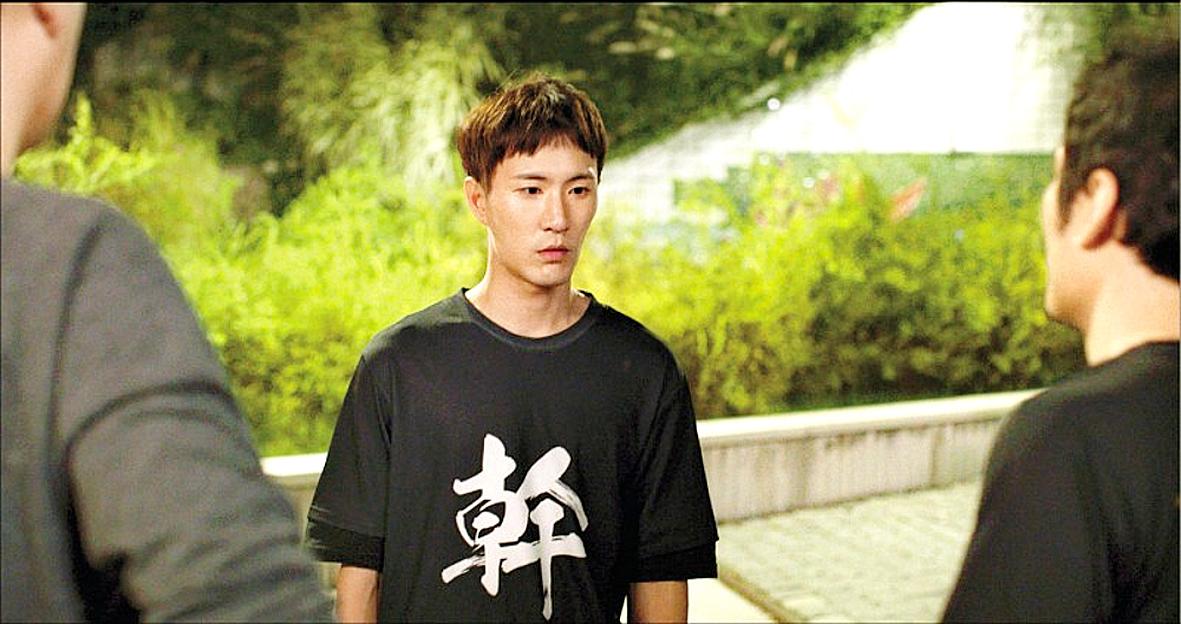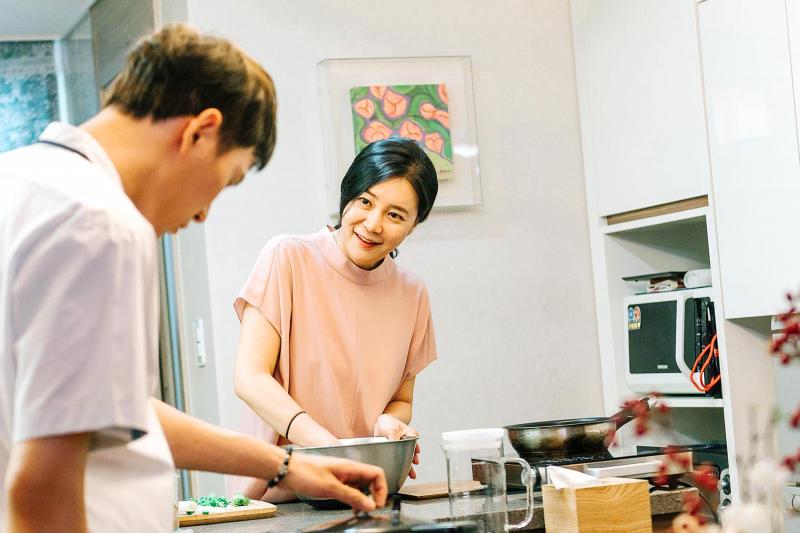Not every movie can remain earnest and heartwarming despite the protagonist strolling around his South Korean hometown in a T-shirt emblazoned with Taiwanese obscenities. It gets more absurd later when we find out he owns different colors of the same shirt, and even his Korean love interest wears one.
However, it’s a fitting juxtaposition in Jang-Gae: The Foreigner as the mixed-heritage Gwang-yong (Ho Yeh-wen, 賀業文) tries to be as Korean as he can, clashing with his parents about giving up his Taiwanese passport for a South Korean one. His strict father insists on speaking to him in Mandarin, constantly reminding him to remember their roots.
Ho delivers the nuances of the extremely introspective Gwang-yong’s personality well, perhaps because he also shares a similar background as a third-generation Chinese-Korean. The movie’s title, transliterated as “sauce dog,” is a derogatory term toward people of such backgrounds, referring to a time when Chinese immigrants in Korea were restricted to working in restaurants that sold black bean sauce noodles. It is Gwang-yong’s least favorite Chinese food: you just can’t cover up the smell, he says not-so-subtly.

Photo courtesy of Joint Entertainment
This identity is often confusing, even to Chinese-Koreans like the Lee family, who do not have roots in Taiwan. His father was born in South Korea to Chinese immigrants fleeing the Chinese Civil War, but over half a century later they’re still seen strictly as “foreigners” and don’t have Korean citizenship. Since they emigrated when the Chinese Nationalist Party (KMT) still ruled China, they ended up with Taiwanese documents after the party retreated to Taipei.
Like many overseas Chinese during those days, Gwang-yong’s father attended university in Taiwan. But since he doesn’t have household registration in Taiwan, he couldn’t enjoy full rights despite his citizenship, making this marginalized group feel stateless. Until 2015, they even had to obtain visas to visit Taiwan, and the movie briefly shows footage of “passport equality” protests in front of the Taipei Mission in Korea.
Gwang-yong’s father grew up in a time when Chinese in South Korea were denied citizenship, restricted from property rights and barred from attending Korean schools. Things have changed for Gwang-yong’s generation, but he still suffers from discrimination and is denied significant opporturnities solely due to his status.

Photo courtesy of Joint Entertainment
“They look Chinese but they’re not Chinese, they have Taiwanese passports but they’re not Taiwanese, they were born in South Korea but they’re not Korean,” Director Chang Chih-wei (張智瑋) told the press after the film premiered at last year’s Tokyo International Film Festival.
This quandary is not explicitly explained in the film, but the never-ending challenges that Gwang-yong faces are enough to pique the viewer’s interest in the oft-forgotten issue. After all, not even all people in the situation are aware of it — not even Gwang-yong, who can’t explain to a classmate why he has Taiwanese citizenship.
Despite this background, the plot is actually quite typical for this sort of coming-of-age film, with too many cliched narrative devices designed for emotional appeal. Perhaps that’s what Gwang-yong would want, however, as a regular teen just longing to fit in.

Photo courtesy of Joint Entertainment
But even the cheesier scenes are made somewhat intriguing with Gwang-yong’s identity constantly looming. For example, after one of those “let’s let loose at the amusement center” scenes that inevitably ends up in a karaoke box, his love interest insists that he sings a Mandarin song. He’s surprisingly good despite his usual reluctance to speak the language.
Gwang-yong’s character development is also strong enough to keep the interest of those who want more than just a teen romcom. Director Chang’s experiences as a half Taiwanese, half Korean who grew up in South Africa definitely contributes to the intricacies of such a character.
Chang explained the T-shirt’s significance during the movie’s premiere last year in Tokyo, noting that besides a swear word, gan (幹) also means “just do it” and “tree trunk.”
Through prominently displaying the offending character throughout the movie, Chang wants to draw the audiences attention to the intense conflict and internal discord felt by young Chinese-Koreans like Gwang-yong.
The terms “Hell Joseon” and “Ghost Island Taiwan” are also brought up in the film, used by cynical youth unhappy with their respective countries. Gwang-yong is aware of both terms, but that still doesn’t help him feel accepted in either place.

On April 26, The Lancet published a letter from two doctors at Taichung-based China Medical University Hospital (CMUH) warning that “Taiwan’s Health Care System is on the Brink of Collapse.” The authors said that “Years of policy inaction and mismanagement of resources have led to the National Health Insurance system operating under unsustainable conditions.” The pushback was immediate. Errors in the paper were quickly identified and publicized, to discredit the authors (the hospital apologized). CNA reported that CMUH said the letter described Taiwan in 2021 as having 62 nurses per 10,000 people, when the correct number was 78 nurses per 10,000

As we live longer, our risk of cognitive impairment is increasing. How can we delay the onset of symptoms? Do we have to give up every indulgence or can small changes make a difference? We asked neurologists for tips on how to keep our brains healthy for life. TAKE CARE OF YOUR HEALTH “All of the sensible things that apply to bodily health apply to brain health,” says Suzanne O’Sullivan, a consultant in neurology at the National Hospital for Neurology and Neurosurgery in London, and the author of The Age of Diagnosis. “When you’re 20, you can get away with absolute

May 5 to May 11 What started out as friction between Taiwanese students at Taichung First High School and a Japanese head cook escalated dramatically over the first two weeks of May 1927. It began on April 30 when the cook’s wife knew that lotus starch used in that night’s dinner had rat feces in it, but failed to inform staff until the meal was already prepared. The students believed that her silence was intentional, and filed a complaint. The school’s Japanese administrators sided with the cook’s family, dismissing the students as troublemakers and clamping down on their freedoms — with

As Donald Trump’s executive order in March led to the shuttering of Voice of America (VOA) — the global broadcaster whose roots date back to the fight against Nazi propaganda — he quickly attracted support from figures not used to aligning themselves with any US administration. Trump had ordered the US Agency for Global Media, the federal agency that funds VOA and other groups promoting independent journalism overseas, to be “eliminated to the maximum extent consistent with applicable law.” The decision suddenly halted programming in 49 languages to more than 425 million people. In Moscow, Margarita Simonyan, the hardline editor-in-chief of the